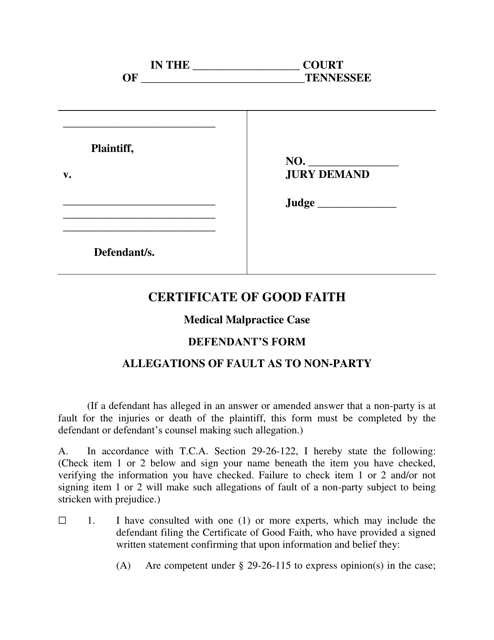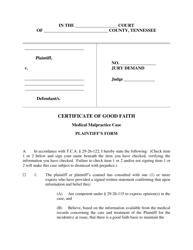Certificate of Good Faith in Medical Malpractice Case - Defendant's Form - Tennessee
Certificate of Good Faith in Medical Malpractice Case - Defendant's Form is a legal document that was released by the Tennessee State Courts - a government authority operating within Tennessee.
FAQ
Q: What is a Certificate of Good Faith in a medical malpractice case?
A: A Certificate of Good Faith is a document that the defendant in a medical malpractice case must file to show that there is a good faith basis for the lawsuit.
Q: Why is a Certificate of Good Faith required in Tennessee?
A: In Tennessee, a Certificate of Good Faith is required to prevent frivolous medical malpractice lawsuits and to ensure that there is a valid claim.
Q: Who is responsible for filing the Certificate of Good Faith?
A: The defendant, or their attorney, is responsible for filing the Certificate of Good Faith.
Q: What information is included in the Certificate of Good Faith?
A: The Certificate of Good Faith includes a statement explaining why the lawsuit is based on a legitimate claim and that a qualified medical expert has reviewed the case.
Q: What happens if a defendant fails to file a Certificate of Good Faith?
A: If a defendant fails to file a Certificate of Good Faith, it may result in the dismissal of the case or other legal consequences.
Q: Can a plaintiff request to waive the requirement of a Certificate of Good Faith?
A: Yes, a plaintiff can request to waive the requirement of a Certificate of Good Faith, but the court must approve the request.
Q: Is a Certificate of Good Faith required in all medical malpractice cases in Tennessee?
A: Yes, a Certificate of Good Faith is required in all medical malpractice cases in Tennessee, unless it is waived by the court.
Q: Who can provide the required medical expert opinion for the Certificate of Good Faith?
A: The medical expert providing the opinion for the Certificate of Good Faith must be qualified and experienced in the relevant field of medicine.
Q: Can a Certificate of Good Faith be challenged or disputed by the plaintiff?
A: Yes, a plaintiff can challenge or dispute the Certificate of Good Faith, but it is ultimately up to the court to determine its validity.
Q: What is the purpose of the Certificate of Good Faith?
A: The purpose of the Certificate of Good Faith is to ensure that medical malpractice lawsuits in Tennessee have a legitimate basis and are not filed frivolously.
Form Details:
- The latest edition currently provided by the Tennessee State Courts;
- Ready to use and print;
- Easy to customize;
- Compatible with most PDF-viewing applications;
- Fill out the form in our online filing application.
Download a printable version of the form by clicking the link below or browse more documents and templates provided by the Tennessee State Courts.





